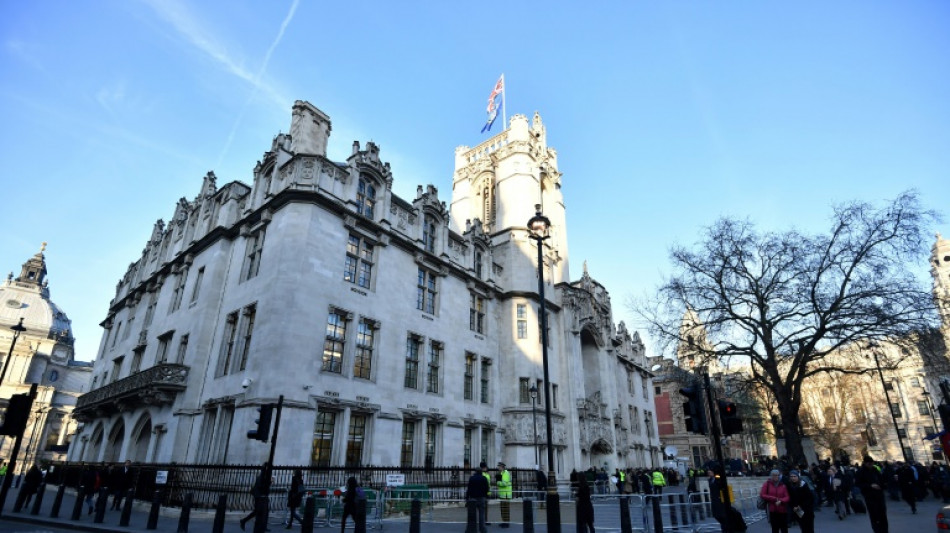
-
 US senator says El Salvador staged 'margarita' photo op
US senator says El Salvador staged 'margarita' photo op
-
Ford 'adjusts' some exports to China due to tariffs

-
 Thomas maintains two-shot lead at RBC Heritage
Thomas maintains two-shot lead at RBC Heritage
-
US to withdraw some 1,000 troops from Syria

-
 Four killed after spring storms wreak havoc in the Alps
Four killed after spring storms wreak havoc in the Alps
-
Spurs' Popovich reportedly home and well after 'medical incident'

-
 Trump goes to war with the Fed
Trump goes to war with the Fed
-
Celtics chase second straight NBA title in playoff field led by Thunder, Cavs

-
 White House site blames China for Covid-19 'lab leak'
White House site blames China for Covid-19 'lab leak'
-
Norris edges Piastri as McLaren top Jeddah practice

-
 Trump warns US could ditch Ukraine talks if no progress
Trump warns US could ditch Ukraine talks if no progress
-
Judge denies Sean 'Diddy' Combs push to delay trial

-
 80 killed in deadliest US attack on Yemen, Huthis say
80 killed in deadliest US attack on Yemen, Huthis say
-
Lebanon says two killed in Israeli strikes in south

-
 Trump says US will soon 'take a pass' if no Ukraine deal
Trump says US will soon 'take a pass' if no Ukraine deal
-
F1 success is 'like cooking' - Ferrari head chef Vasseur

-
 Cycling mulls slowing bikes to make road racing safer
Cycling mulls slowing bikes to make road racing safer
-
Macron invites foreign researchers to 'choose France'

-
 Klopp 'happy' in new job despite Real Madrid rumours: agent
Klopp 'happy' in new job despite Real Madrid rumours: agent
-
Alcaraz into Barcelona semis as defending champion Ruud exits

-
 Vance meets Italy's Meloni before Easter at the Vatican
Vance meets Italy's Meloni before Easter at the Vatican
-
Evenepoel returns with victory in Brabantse Pijl

-
 Maresca confident he will survive Chelsea slump
Maresca confident he will survive Chelsea slump
-
Mob beats to death man from persecuted Pakistan minority

-
 Lebanon says one killed in Israeli strike near Sidon
Lebanon says one killed in Israeli strike near Sidon
-
Arsenal's Havertz could return for Champions League final

-
 US officials split on Ukraine truce prospects
US officials split on Ukraine truce prospects
-
Client brain-dead after Paris cryotherapy session goes wrong

-
 Flick demands answers from La Liga for 'joke' schedule
Flick demands answers from La Liga for 'joke' schedule
-
'Maddest game' sums up Man Utd career for Maguire

-
 Trial opens for students, journalists over Istanbul protests
Trial opens for students, journalists over Istanbul protests
-
Gaza rescuers say Israeli strikes kill 24 after Hamas rejects truce proposal

-
 'Really stuck': Ukraine's EU accession drive stumbles
'Really stuck': Ukraine's EU accession drive stumbles
-
'Not the time to discuss future', says Alonso amid Real Madrid links

-
 74 killed in deadliest US attack on Yemen, Huthis say
74 killed in deadliest US attack on Yemen, Huthis say
-
Southgate's ex-assistant Holland fired by Japan's Yokohama

-
 Vance meets Meloni in Rome before Easter at the Vatican
Vance meets Meloni in Rome before Easter at the Vatican
-
Ryan Gosling to star in new 'Star Wars' film

-
 Hamas calls for pressure to end Israel's aid block on Gaza
Hamas calls for pressure to end Israel's aid block on Gaza
-
Russia says Ukraine energy truce over, US mulls peace talks exit

-
 58 killed in deadliest US strike on Yemen, Huthis say
58 killed in deadliest US strike on Yemen, Huthis say
-
Museums rethink how the Holocaust should be shown

-
 Three dead after deadly spring storm wreaks havoc in the Alps
Three dead after deadly spring storm wreaks havoc in the Alps
-
No need for big changes at Liverpool, says Slot

-
 Bloody Philippine passion play sees final performance of veteran 'Jesus'
Bloody Philippine passion play sees final performance of veteran 'Jesus'
-
New US envoy prays, delivers Trump 'peace' message at Western Wall

-
 Postecoglou sticking around 'a little longer' as Spurs show fight in Frankfurt
Postecoglou sticking around 'a little longer' as Spurs show fight in Frankfurt
-
US threatens to withdraw from Ukraine talks if no progress

-
 Tears and defiance in Sumy as Russia batters Ukraine border city
Tears and defiance in Sumy as Russia batters Ukraine border city
-
Russia rains missiles on Ukraine as US mulls ending truce efforts


UK top court rules definition of 'a woman' based on sex at birth
Britain's Supreme Court ruled Wednesday the legal definition of a "woman" is based on a person's sex at birth, a landmark decision with far-reaching implications for the bitter debate over trans rights.
In a win for Scottish gender-critical campaigners who brought the case to the UK's highest court, five London judges unanimously ruled "the terms 'woman' and 'sex' in the Equality Act 2010 refer to a biological woman, and biological sex".
However, the court underlined that the Equality Act also protected transgender people from discrimination.
The act "gives transgender people protection" through the protected characteristic of gender reassignment, but also protecting against discrimination in their acquired gender, Justice Patrick Hodge said handing down the verdict.
It is the culmination of a years-long battle between the Scottish government and campaign group For Women Scotland (FWS) -- which launched an appeal to the Supreme Court after losing pleas in Scottish courts over an obscure legislation aimed at hiring more women in public sector bodies.
Dozens of FWS and other gender critical campaigners, who argue that biological sex cannot be changed, cheered with joy after the ruling, hugging and crying outside the court.
"This has been a really, really long ride," said Susan Smith, co-director of For Women Scotland, adding the campaigners were "enormously grateful for this ruling".
"Today, the judges have said what we always believed to be the case: that women are protected by their biological sex," she said, adding "women can now feel safe that services and spaces designated for women are for women".
Ahead of the verdict, trans rights activists raised concerns that a ruling in favour of FWS could risk discrimination against trans people in their chosen gender.
"The court is well aware of the strength of feeling on all sides which lies behind this appeal," Hodge said, recognising the fight of women against sex discrimination, as well as a "vulnerable" position of the trans community.
- Single-sex spaces -
At the heart of the legal battle were clashing interpretations of the Equality Act.
While the Scottish government argued that the Equality Act (EA) afforded trans women with a Gender Recognition Certificate (GRC) with the same protections as a biological female, FWS disagreed.
In its judgement, the Supreme Court ruled that the devolved Scottish government's "interpretation is not correct" and that the Equality Act was inconsistent with the 2004 Gender Recognition Act which introduced GRC certificates.
According to the judges, allowing for the Scottish government's interpretation would "cut across the definitions of man and woman" in the Equality Act "in an incoherent way".
And, single-sex spaces and services including changing rooms, hostels and medical services "will function properly only if sex is interpreted as biological sex", the judgement added.
Despite underlining protections from discrimination, the ruling will be a blow for transgender women and their ability to access single-sex spaces -- a significant contention in the polarised debate on trans rights.
- Online discourse -
The debate has been particularly vicious in the UK, pitting gender critical activists against trans rights campaigners and often resulting in bitter, even hateful discourse.
One of the most prominent supporters of gender critical campaigns is "Harry Potter" author JK Rowling, who lives in Scotland and has been the target of hate but also been accused of transphobia.
The ruling also comes at a time when transgender rights are under threat in the United States under President Donald Trump.
Since retaking office, Trump has declared the federal government would recognise only two sexes, male and female, sought to bar trans athletes from women's sports and curbed treatments for trans children.
The latest UK ruling could pile pressure on Prime Minister Keir Starmer's government -- which has remained largely silent on trans issues since coming into power last July -- to further clarify legislation.
The opposition Conservative administration had blocked Scottish legislation to make gender change easier in 2022 and has supported the clarification of sex as biological sex rather than assumed gender.
D.Schaer--VB

